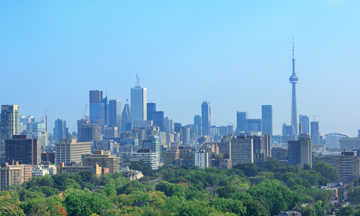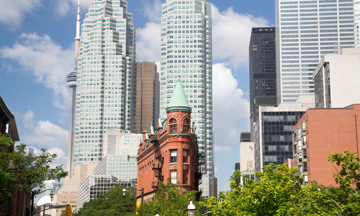
Following an era of exorbitant hyperinflation in Canadian luxury real estate, new post-pandemic benchmarks were established in 2022 as the housing market responded to a cascade of stressors. Against a backdrop of mounting economic uncertainty, steep interest rate hikes, escalating inflation, a stubborn deficit of housing inventory and sweeping housing taxation and regulatory changes, prospective luxury real estate sellers and buyers withdrew strategically from the market in anticipation of greater opportunity in 2023. By the end of 2022, the country’s major metropolitan areas emerged from a historic chapter of hyperinflation into a new era where consumer demand for housing and housing mobility remained unrelenting, just as market conditions verged on favouring buyers.
“After an era of intense hyperinflation, new post-pandemic benchmarks for Canadian conventional and luxury real estate were established in 2022 as the market processed the impact of aggressive interest rate hikes and the effects of an increasingly uncertain global and domestic economic climate. By the end of the year, luxury housing segments in several major metropolitan areas were on the brink of buyers’ market conditions, while others had very clearly shifted into this territory,” says Don Kottick, President and CEO of Sotheby’s International Realty Canada. “The market is now on the verge of another important adjustment, this time in terms of pricing. It has taken several months for home sellers to realize the impact of the changing market on the market values of their properties. As new property listings come onto the market in 2023, their pricing will shift to meet current realities. This will start to unlock long-awaited opportunities for buyers and upsizers to purchase homes that meet their lifestyle needs as they acclimatize to the market.”
According to Kottick, a fundamental deficit of housing across every property type and price category will continue to challenge major metropolitan housing markets, and in particular, Vancouver and Toronto. Although housing prices are expected to adjust downward to realistic market norms in several major metropolitan areas, pent-up demand for housing mobility as well as anticipated population gains from immigration will continue to support housing values in the long term. The “Prohibition on the purchase of residential property by non-Canadians Act” (the “Foreign Buyers Ban”) that came into force January 1, 2023, as well as demand-side policies and taxes will have a negligible effect on affordability, according to Kottick, and have largely served to confuse and frustrate prospective new Canadians at a time when the country is aiming to attract skills, talent and capital.
Market Highlights
Toronto
According to new data released by Sotheby’s International Realty Canada, luxury sales activity in the Greater Toronto Area (Durham, Halton, Peel, Toronto and York) receded through the course of 2022, as listings supply faded, and buyers temporarily retreated. Residential real estate sales over $4 million (condominiums, attached and single-family homes) fell 24% year-over-year, while ultra-luxury sales over $10 million on Multiple Listing Service (MLS) declined 29% from 2021 levels. Sales of condominiums, attached and single-family homes over $4 million fell 29%, 25% and 23% year-over-year, respectively. Overall, $1 million-plus residential sales saw an annual decline of 28%, despite underlying demand for top-tier housing and housing mobility.
Vancouver
Vancouver’s luxury real estate market experienced a sharp decline in sales activity following the first quarter of the year as prospective buyers, frustrated by an era of heated market conditions, paused in anticipation of more favourable opportunities ahead. Overall, residential sales over $4 million and $10 million closed at volumes 30% and 46% below 2021 levels. Luxury condominium sales over $4 million remained stable with a nominal 3% year-over-year uptick, while attached home sales declined 73%. The city’s $4 million-plus single-family home saw sales decrease 32% year-over-year, while ultra-luxury single-family home sales over $10 million fell 46%. Overall, residential real estate sales over $1 million were down 29% in 2022 from the city’s record sales volume in 2021.
Montréal
Montreal’s luxury real estate market tempered to more balanced conditions over the course of 2022. The city closed the year with $4 million-plus residential real estate sales nearly on par with 2021 levels, with a modest 2% year-over-year uptick, while sales activity over $1 million experienced an 18% annual decline. Overall, $1 million-plus single-family home sales were down 22% year-over-year, while attached home and condominium sales over $1 million fell 23% and 5%, respectively.
Calgary
Calgary’s luxury real estate market out-performed that of Canada’s largest major metropolitan areas, as the city’s strengthening economic fundamentals ignited consumer confidence and civic optimism and as interprovincial-migration lifted demand for the city’s conventional and top-tier housing. As a result, the city’s top-tier market rebounded in 2022, and sales over $1 million rose 16% year-over-year from 2021 levels. Sales over $4 million increased 50% to six properties sold. $1 million-plus single-family and attached homes sales saw 12% and 68% annual sales gains, respectively, while condominium sales over $1 million experienced a significant 79% year-over-year increase.


